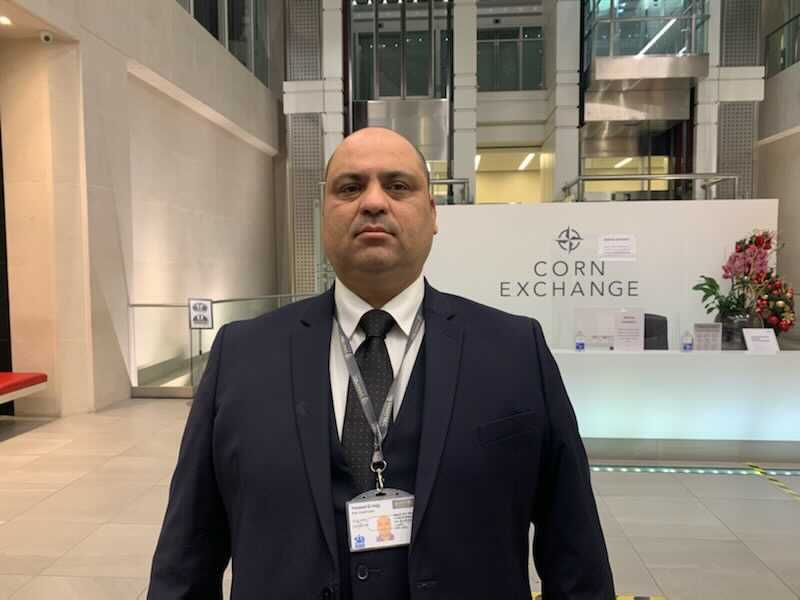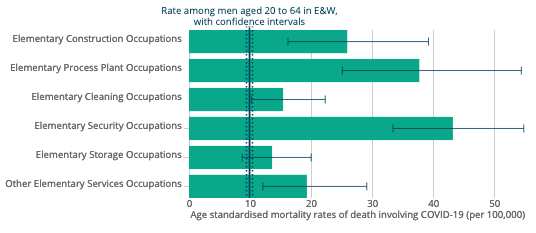Forgotten security staff fear for jobs and health at near-empty London offices
“We’re essential workers. We travel every day, we’re on the frontline, and we’re more exposed.
“A lot’s been said about the sacrifices made by couriers, supermarket workers and NHS workers, and rightly so. But little’s been said about security guards.”
Yousseff El Hajji is a security officer at the Corn Exchange building in the City of London.
Like many security workers at office blocks across the UK, he has spent much of the past year guarding a near-empty building.
A trickle of just a few dozen workers have filed in on most days, where once there was a steady stream of more than a thousand. On some days during the tightest lockdowns the number has dropped to zero.
The coronavirus crisis has thrown up an array of new challenges for such staff, on top of the tedium and isolation of such limited human interaction in once-bustling workplaces.
Many have not only put themselves at risk and been handed new responsibilities while desk workers shelter at home, but also fear for their jobs. In the short term some landlords are slashing costs, and in the long run they worry home-working could wipe out much of their sector for good.
The ‘hidden workforce’ at high risk from COVID-19

Workers like El Hajji have good reason to feel overlooked. They carry out their daily duties out of sight of legions of home workers. Sub-contracting reinforces the divide from office landlords and tenants.
But the industry appears more widely under-appreciated. Security officers were not mentioned at all by the public in a YouGov poll about essential workers earlier this year.
Security guards came in ninth when respondents were asked to rank various roles by importance, behind postal workers and pharmacists and narrowly in front of traffic wardens. The industry has even launched a campaign to raise awareness of their roles, entitled: “The Hidden Workforce.”
Such limited acknowledgement is all the more striking when official figures suggest workers in the security sector are some of the most at risk from COVID-19.
Security guards have the highest male death toll from the pandemic of any occupation. In an overwhelmingly male industry, more than 100 men died between March and June, though statisticians point out correlation with their line of work does not mean causation.
Officers themselves are well aware of the risks. “Many security guards have fallen sick,” said Shehzad Zaib, a colleague of El Hajji at corporate security firm SmartSec Solutions.
WATCH: Goodbye offices? Examining if the shift to remote working will last
Zaib keeps away from his family when he returns home from his own workplace, another office block in London’s West End. He heads straight to the bathroom, showering and putting his clothes in the wash before hugging his wife and children.
Buildings have COVID-19 safety measures in place, but staff say some contact with others is almost inevitable in their work even when offices are near-empty. “Cleaners, contractors, colleagues; we have to interact and give passes,” said El Hajji.
A greater worry for many staff is public transport, according to Fawad Ahmad, director of SmartSec Solutions.
Many of his workers used to drive into London before 7am and leave after 6pm, avoiding the congestion charge. But Transport for London (TfL) raised the levy in June and extended it to 10pm and weekends, costing drivers £15 a day.
“Now they don’t have any other choice but to use the underground, buses or trains,” said Ahmad, warning the charges were putting their safety at risk.
A TfL spokesman said the changes were forced by government. He added they were “essential” to let more people walk and cycle and limit air pollution, warning car traffic could double if people drove rather than using public transport.
“Rigorous and enhanced cleaning of trains, buses and stations continues to ensure public transport is cleaner than ever, with recent independent tests showing no sign of the virus on the network and we continue to run a full planned service,” he said.

Firms’ battle to survive
Some staff at SmartSec, which handles security at around 110 London buildings, are optimistic about vaccine advances, according to El Hajji.
But while mass vaccinations could eventually help revive ailing city centres, firms in such areas face a more urgent battle to survive. The troubles of pubs, cafes and shops in office districts have been well-publicised, but security firms are also taking a hit.
Ahmad said SmartSec’s rivals have seen landlords halve their security coverage as giant blocks have hollowed out. Some of his clients have cut staffing to save money, though he considers himself lucky to have avoided lay-offs. Security and safety risks can be even higher with buildings near empty.
READ MORE: UK economic recovery goes into reverse as lockdown hits firms
“What we’re struggling with is getting paid,” he said. His company has had to take out loans and threaten a few landlords with legal action, according to Ahmad. Some clients reportedly let bills rack up in the hundreds of thousands of pounds as some of their tenants had failed to pay rent or service charges. “We are at the a***-end of it.”
Landlords also told Ahmad they could not keep staff on when the furlough scheme came close to being withdrawn in October. Only its belated extension to March stopped a wave of redundancies, some by a matter of days. “It was a glimpse of what will come after,” said Ahmad grimly.
Fears home working will ‘become the rule’

SmartSec’s staff are under no illusion that vaccines or mass testing will be a panacea for the corporate security sector and their livelihoods.
“Working from home will become the rule,” predicted El Hajji. “I heard in one office they sent a survey, and 90% said they preferred working from home.”
Ahmad said some office-based firms were already slashing their footprint, with one cutting its floorspace in a block SmartSec covers from four floors to one. “Most companies are thinking — what’s the point coming into London now people can work from home?
“That’s the future. And they’ll start moving out of London to business parks where parking’s not a problem, rents and rates are good, and people come in maybe one or two days a week.”
READ MORE: Why offices will still exist in the remote-working world
One central London landlord has even decided to convert their commercial building into flats after tenants did not renew their leases, according to Ahmad.
“It’s scary for us as a business, and the officer there wonders—what’s going to happen to me?” he said.
“Morale is really low. Before there was banter, you talk,” said Ahmad, who started out as a frontline officer himself. “Now you sit by yourself thinking not only about the health of your family, but is your job secure.
Ahmad hopes his own firm can at least find new opportunities in public sector property management. He also hopes the government will provide new incentives to support the recovery of city centres, and wants the congestion charge scrapped while the pandemic persists. “London is the heartbeat of the country. It will give some life back.”

 Yahoo Finance
Yahoo Finance 